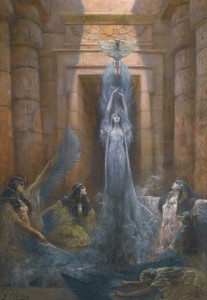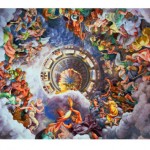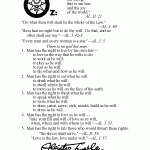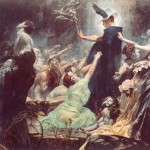 Polytheism is not a mere belief. To be real, it must be practiced, and then we meet the Gods face to face…
Polytheism is not a mere belief. To be real, it must be practiced, and then we meet the Gods face to face…
Developing a ‘way’ for polytheism in contemporary society is part of the purpose of Paganism today. We need a spiritual and embodied form of pluralistic values to establish a harmonious cosmopolitan world and polytheism does so in a way no other theological framework can. Yet creating this world will require work. As we discussed last post there are many kinds of Deities to be experienced, now we will go more into the means to know Them. This begins with invocation.
Invocation
The process of invocation is in essence the process of feeling what it is to be the deity that is being invoked or at least to be in their presence. By focusing attention on the deity through words, gestures or objects, all of which are symbols associated with the deity, the deity is felt or embodied. The symbols convey the distinct character of the deity and impart it to those who let the symbols impact them deeply. The result is feeling like the Deity or seeing the world from Their point of view. The value of this is that their ‘point of view’ includes the wisdom or skills for competence in the arena of life they are associated with. While you are ‘wearing’ the deity these are more available to you and, with continued invocation, the skills of the deity are retained even after ‘dismissing’ the deity.
Invocation in which you become the deity is a method of union with deity, very popular in the East and termed ‘Deity-yoga’, but not so in the West. The West tends, in Judaism, Christianity, and Islam, to ‘dwell in the presence’ of the deity, which has a similar, though not identical effect. ‘Dwelling in the presence’ tends to have a mood of adoration and brings comfort and support. ‘Becoming the deity’ moves from adoration to identification with the deity and brings empowerment. For me each time I invoke or become another deity, my world also gets larger, more pluralistic, more accepting. Each deity invoked is time spent walking in another being’s shoes, helping me become more compassionate.
God-Forms
Unlike humans who live in their bodies, the essence or presence of a Deity is separable from the form or ‘body’ of the Deity. This is because the form of the Deity is much like the shell of a crustacean, the living meat is inside the rigid calcified shell, but the shell is not part of the living creature, it just lives there until it out-grows it. For Deities, entities of a wholly different order of being, to communicate with us they need to assume a form that has a mouth and ears. Usually the Deity chooses a human-like form and this helps us to relate to the Deity. It appears to look at us, talk with us, and have similar emotions or expressions of emotion as we do. Yet, this ‘form’ is just a puppet the Deity is manipulating in order to translate its message into something we can apprehend. The essence or presence of the Deity presents itself to us by the medium of the form.
The implication of this phenomenon is reflexive; while the Deities can create and use forms to speak with us, we too can use these ‘god-forms’ to speak with the Deities. The shell-like quality of the Deity’s form permits it a separate life from the Deity’s essence or presence. Having impacted the minds of humans for long enough the form can be accessed directly through visualization or ritual. Doing so tends to attract the living essence that is the actual Deity but not always. In a very real sense the form of the Deity is a perfect environment for the Deity while it is in our world and the very establishment of the correct form attracts the Deity like a comfortable chair. When the Deity does not show up all is not lost. The form itself bears the articulation or power of the Deity and will perform the requested boon.
One other feature of god-forms is that they can be worn by humans. Through the careful cultivation of the form in meditation the subtle form of the practitioner can be shaped to that of a Deity to the point that the mind of the human can merge with the mind of the Deity. The practitioner can then apply the wisdom and the power of the Deity in the world, yet retain the practitioner’s own essence. This is the art of Deity Yoga as practiced in its non-dual form.
Deities are not the only creatures who make forms that humans can wear. Humans, in their process of attaining to enlightenment, which some equate with divinization, also create a similar kind of form. This form is the embodiment of their process and path to enlightenment. It is left behind as a means for those who follow in the path of the enlightened One. They can treat it like a Deity-form and by invoking and inhabiting it acquire the wisdom of the thus-gone One and that One’s powers. The principal power being the attainment of enlightenment, the follower is quickly brought along the path to her own attainment.
Wholeness
Selecting the right Deity and Deities to work with is crucial. With practice, good advice comes from the Gods Themselves. This can lead one to connect with Deities from the world over or to focus on a single culture. A helpful aspect of working only with the pantheon of a particular culture is that it comprises a complete set. There is a wholeness to it when grasped altogether that provides a well rounded way of relating to the world. When we start breaking apart pantheons, selecting those deities that we need or want to work with we start imbalancing our system of deities. I handle this by establishing sets of deities that are specifically arranged in a whole set and working with them all to attain to that well-rounded balance. For example one way I do this is with planetary deities. Astrology, like most divinatory systems is constituted by whole sets and so is suited to the task. Also, as pointed out in Hamlet’s Mill by De Santillana, the seven classical planets and their associated deities provide a Rosetta Stone for comparison and translation between widely separate myth systems. These range from the Mahabharata to Hamlet to the myths of the Dogon of Africa.
The principle virtue of working with the planets is that they provide a symbol set for one of the deep structures of our society, and other societies as well, if De Santillana is correct. For instance we have seven days of the week, each named for a planet. Some systems have seven worlds or layers of realms, there are seven classical metals in alchemy, and so on. Seven is a sacred number the world over. When we look at the Olympian deities, they cluster around the seven planetary types, both male and female, although the male tends to be emphasized.
Why invoke the Gods?
All this fantastic technique begs the question Why? Why would someone go to all this trouble to invoke these many deities? It comes from the heartfelt intuitive realization that here in the world in which we live, all is not as it could be. Many suffer and it is intolerable not to act to end that suffering. Deities are influential forces whose powers can be brought to bear on the world, potentially changing its historical course for the better. Being aware of these powers and being able to make them present and effective brings with it the responsibility to do so and to do so wisely. My task as a priest is to work with the powers that I know of and cause the changes in the world necessary to end the suffering in it. I know of no higher goal.
Personal Approach
Now, after years of training, education, and practice, and called by the Gods I serve, I am a Pagan priest. On the way here I learned and evolved an approach to polytheistic religion. First, I look for a deity that fits in my life. In part I do this by reading stories and myths of the deities, mostly of cultures I feel an attraction to. I am of Irish descent and so her deities have a cultural appeal. On the other hand the Greek Deities have had such an impact on Western thought that their presence is rich in our culture. Their relevance seems quite palpable. For instance, I know far more of the Greek Odyssey than the Welsh Mabinogion. During a visit to Manhattan Island, I saw not a single image of an Irish God, but the buildings were virtually overgrown with images of Mercury. Clearly this One has a deep impact on my world.
From this mass of data I sort out a deity whose nature is relevant to my life. Sometimes I do this by identifying an arena in my life, like work, school, relationships, etc., that is important to me. Because it is important to me I wish to improve my skills in that arena. I then look for a deity that has domain in that arena. Or sometimes the attraction to the deity comes first and with it comes focus on their respective arena.
The deity is (in part) the embodiment of competence in their arena. Mars, for example is competent in war. To be an embodiment means that the deity can be experienced as a “lived-through” feeling of distinct character. Some metaphors that describe this experience are ‘looking through the eyes of the deity’ or ‘wearing the form of the deity’.
To have this experience I invoke the deity by their qualities and attributes that I found in the myths and in tradition. I begin with praise and description, calling to mind the image, the sound, the feel of the deity. The pattern of invocation is sometimes described as, “I call you, I see you, I see you come, I come before you” and sometimes, “I become you.”
Priest of Hermes
For example, I principally function in our community as a priest of Hermes today. As a companion of the road, as a friend of humankind or glib of speech, Hermes’ power in a general but vague way, relates to today. But as Lord of the Threshold, teacher of writing, giver of technology and inventor of musical instruments, His mastery of Information and Wisdom and being a guide on the path of Transformation has particular application to our society. It took my getting inside the traditional qualities associated with Hermes and then looking out at my world to see how He is manifest now. When I did, I found Him looking back at me, grinning.
After spending years in the kind of invocations I have alluded to I began to experience some of the deities as something other than a ‘psychic mask’ through which I view the world. The deities began to have some presence and volition other than what I had invoked.There was an impulse to engage in dialogue. However, I was dubious of what I heard and so suppressed this kind of connection. It took meeting a priestess of Hekate who introduced me to the Queen of Witches, to have a sufficiently clear contact with another consciousness to recognize it. This changed my assessment about the nature of deities.
It is easy to delude yourself about having mind-on-mind contact. However, the awe and trembling felt in the presence of a deity, or of any greater spirit, is unmistakable. It was the feeling of being in the presence of such tremendous power that I began to realize our, Hekate’s and mine, relative places in the scheme of things. Having established relationship with Her, She lead me through many learning experiences that deepened my practice. She, through these experiences, enabled me to better relate to deities so that I could perceive them as beings and not dead forms animated by my attention. I realized that at least some of these deities are living entities of another plane of existence than my own.
Through Hekate I also became quite clear that deities are not all-powerful. In a deep yet subtle way they have a limited effect on the physical plane, however much they may be an embodiment of a natural force. They need us as willful collaborators in this realm as they work in their own. Working with the Deities and not for them may be a (post-)modern phenomenon. Raised an American, I am not willing to subjugate myself or my will to any being, however powerful. Yet I am willing to work with that which is much more powerful than I to achieve my ends. Driving a car or using electricity are commonplace examples of these. As I have worked with several deities in this manner, the metaphors that describe our relationships are not liege and subject, or parent and child, but as collaborating friends or as lovers. There are echoes of this as far back as Sumer where the High Priestess was married to the God of the temple and the High Priest to the Goddess. But there is something different in the modern form that the deities are accommodating themselves to, something about the indomitable nature of the human spirit.
The very fact of this accommodation is somewhat contradictory to the usual understanding of deities as immortal and unchanging. Over the years I watched as Hekate has grown and changed in Her manifestations, becoming as it were a better Goddess for these times. She is better able to relate to our problems and better able to understand our character and resources. This tells me that these deities are alive, for growth and change are the hallmark of life.
Nowadays, I work with Hekate in tandem with Hermes, the Greek ‘Messenger’ God, and did for many years along with my late wife who was a priestess of Hekate. In some forms of their myths they are lovers, and thus suitable for a husband and wife team. They each bear the title ‘psychopompos’, or ‘guide of souls’, and are preeminent practitioners of magick and transformation, keepers of thresholds and crossroads. Since her profession was social work and psychotherapy, and mine is technology and publishing, and together much of our work involved initiatory ritual, They are excellent colleagues.
Polytheism has a deep and long history in the Pagan movement. Since Gardener, many of the Witches and Pagan magi have cultivated deep relationships with individual Deities and whole pantheons. We see the development of this as we look back into the older, Magical, movement stretching back into the 1400s and the slow, often deadly effort to revive the worship of the Many Gods. Using invocation and the ancient art of theurgy, our forbears found their way to the Gods and lay the groundwork for us to today to work polytheism. Let us fulfill their legacy by building enduring communities of practice, establishing the knowledge, worship, and experience of the Many Gods down the generations.













